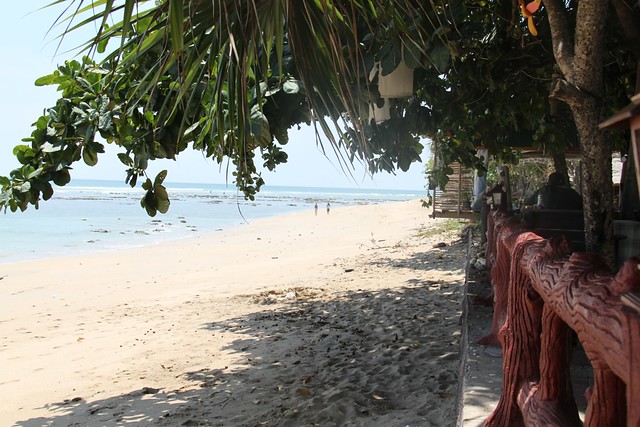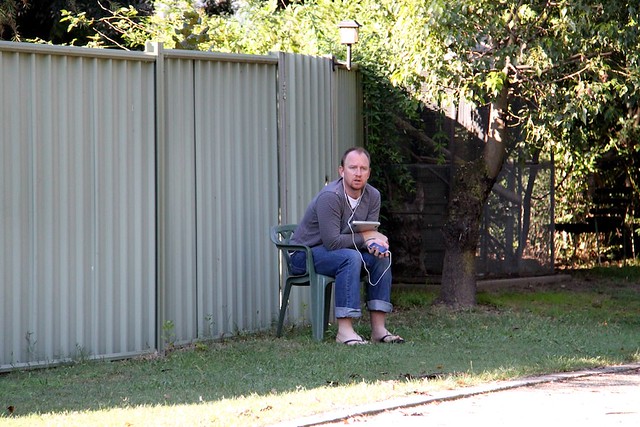Tips for calculating a realistic travel budget
Be realistic to avoid under-budgeting
Staying in a rustic bungalow on the beach with only a fan for $10 a night or camping on the side of a road might sound appealing when you stuck in your house surrounded by your mountains of belongings paying off expensive bills. But you need to be honest with yourself – is this romantic notion how you are actually going to travel? And more importantly, travel long term?
If you are someone that struggles with camping at the best of times, maybe roughing it isn’t for you.
Picture yourself staying in a small single room or tent with no access to power or perhaps for only a few hours a day when the generator is running. You might not have phone reception or Internet, and you are a really long walk to the nearest store. Now picture this for days, weeks or months on end.
If that sounds like a dream come true then fantastic, start calculating away!

But if is sounds like something you could really only love doing for a few nights before returning to a few more comforts then don’t fool yourself and base your budget on $10 beach bungalows and free campsites for 12+ months. You will all end up miserable or going over budget and running out of money.
Until you get there doing it night after night it’s really hard to predict. It may turn out that living simply in a spartan bungalow or tent is the life you were all craving and you wonder why you didn’t do it sooner. It may be the best thing you’ve ever done as a family.
Or it may not. Or you might fall somewhere in between – happy to do it for 5 nights out of 7 so long as you can have an occasional night somewhere nicer.
If you are even a tiny bit unsure don’t calculate your budget based on the cheapest possible accommodation. Pick the next level up. If you do end up loving the rougher side of travel than fantastic, you have even more money than you thought you did.
The same goes for transport. Cheap long haul buses can certainly sound appealing when you look at the prices but you may find when you have tired kids who need to pee every half hour it’s occasionally worth splurging on those faster, more comfortable buses.
You can travel and live cheaply with kids, staying in simple accommodation, taking local transport and eating locally … but maybe not as cheaply as you did pre-kids or for as long. Or maybe you can. I’m not saying you can’t. Plenty of long term travelling families do just this and love it. The point I’m trying to make is you just can’t know if it’s right for your family until you get on the road and experience it so it’s better to calculate your budget based on slightly higher accommodation costs and end up with a surplus than not having enough money.
Don’t forget the pre-trip costs
Jess from With Two Kids in Tow its Backpacking We Go recently wrote a fantastic breakdown of the cost of their 12 months on the road.
On average they spent just under $68 a day. But then Jess went on to demonstrate that when you include all their pre-trip expenses like vaccinations, travel insurance, storage insurance for their gear back home and flights their daily total was almost double this amount.
Flights are probably going to be the biggest part of your expenditure, even using budget airlines. But all of the other things like gear, travel insurance, storage, on-the-ground transport add up. Visas can be another big expense. For some countries, like the USA where many people are able to enter under the inexpensive ESTA program for up to 90 days, the visa costs are minimal. But many countries charge $20-35 per person. If youa re a large family these fees really add up.
Some costs you’ll pay for before you even leave but a lot of them like overnight sleeper trains and visas you need to budget for along the way. Try to factor in as many as you can.
Working on the road
If you need to work on the road, think about what you are going to need to actually work and how that will affect your budget.
Will you have to budget in buying a sim card in each location for your phone or USB modem? Do you need additional travel insurance to make sure your IT equipment is covered? Do cients back home need to be able to get in contact you on a phone? Maybe you need to look into paying for a Skype number that allows clients to contact you wherever you are in the world at the cost of only a local call to them. How are you going to back up your data?
You might also find that you need to pay a little more for accommodation to have a place that has reliable WIFI and AC. It can be hard to work during the day when it’s 36 degrees Celsius outside and there’s no AC. You may end up costing yourself more in lost productivity than you saved on accommodation.
If you are all staying in the one room then are you going to be able to work with everyone around? Or do you need to allow extra money to cover the cost of working in a cafe a few days a week (or daily) so you can get a few hours of un-interrupted work done?

One thing we’ve also found a challenge is some of the remote destinations we’ve always dreamed to go to just haven’t been a possibility because of electricity and Internet access. Or we’ve spent less time there than we would have liked as we’ve needed to get back online. Which is a shame because not only are they beautiful and relatively unspoilt, they’re also usually the places that are really cheap!
As a consequence of working on the road we spend more time in expensive locations than we originally anticipated because the internet is usually better. And we spend more on accommodation than we’d originally budgeted for because of the need for AC, WIFI or both.
Location, location, location
$50 a day for a family in Paris or London isn’t realistic on a travel budget. Living there that might be more than enough but if you are just passing through for a few days or weeks renting short term, eating out for at least a couple of meals a week, paying for transport and visiting attractions you are going to go through at least twice that, if not three time that.
$50 a day in Laos or Thailand though is totally doable. You might even end up with some change in Laos.
Look at the countries you plan to travel too and how quickly you want to travel. For each of the countries that you plan to travel work out the cost of transport, sightseeing, food and accommodation. Take a look at AirBNB and Hostel Bookers. Even if you don’t plan to stay in a hostel the prices on hostel sites are regularly updated and can give you a good idea of what to expect.
It’s a good idea to look at two locations in each country (assuming you are going to more than one place in that country) – a capital city and a regional area. The prices can be very different.
Don’t forget bank fees on overseas withdrawals
There is almost always a cost to accessing your money overseas. When you are travelling long term, the fees that come with accessing your money are a cost of your travel, just like bus tickets and travel insurance. It’s not like a holiday where you can probably bring all the cash with you from home before you leave. Unless you want to travel with your own Swiss bank accountant carrying large locked brief cases of your money, you are going to have to use ATMs to get your money out overseas on a regular basis.
If you are lucky your bank won’t charge fees on international withdrawals. If you don’t have a bank card that allows this look into it!
But even if you do have a card that doesn’t attract fees on international withdrawals, remember that local ATMs might charge you a fee. The fees are usually small but not always. In Cambodia it cost us $4 per ATM withdrawal. Even though we were withdrawing from the same bank that we use back home!
Thankfully in most countries it’s usually less than a dollar per withdrawal but if you are withdrawing money a few times a week even a few cents per withdrawal can add up over time.
A lot of countries with weaker currencies also only allow you to take a small amount out at a time for an ATM withdrawal. We’ve been in places were the limit was $50 per transaction. You could end up at the ATM a lot more often than you’d think.
And there’s also conversion fees that come with changing currencies. It’s not just the currency exchange offices that charge these. Banks charge them too when you withdraw your money from your bank account back home. Paypal also has some hefty fees for transfers to bank accounts if your income comes in via that method.
On average we get charged $30 a month in bank fees. But at times it has been up to $70 a month.
If you are planning on stopping in one location for several months it’s well worth investigating international banks like HSBC that have branches throughout the world. HSBC allows you to set up a bank account back home and another bank account in the country you are stopped in (assuming HSBC has branches in that country!) and transfer money between the two accounts without incurring fees. Of course it costs a little to set up these accounts in the first place so you need to weigh up those costs.
Travel days are usually more expensive
The days where you actually move from Point A to Point B are usually more expensive. I’m not just talking about the cost of transport. Obviously this incurs an additional expense. I’m talking about all those little extras that seem to creep in on a travel day when you usually end up pressed for time.
You wake up late and suddenly realise you need to take a taxi to the airport not a local bus. Or you arrive late into a new location all tired and don’t feel like spending an hour walking around in search of the cheapest place to eat so you end up spending more on dinner than you usually would.
And lets not forget snacks for the trip. If your kids are anything like ours they will eat like sparrows all week until the moment they are trapped in a confined space like a bus or plane where you find that suddenly you need to purchase a months worth of food to keep them occupied for the trip. And of course unless you plan for that beforehand you’ll end up buying all those snacks at a bus stop convenience store with higher prices or ordering from the in-flight menu.
Budgeting while on the road
Track your expenses
When you track all your expenses you usually spend less. It’s that simple.
Travelling around cheap countries it can be all to easy to fall into the trap of spending extra money on incidentals without thinking about the costs. A $5 bike rental, $2 to go to a temple, ice creams for the kids, a visit to an indoor playground, an extra beer with dinner … they can all quickly add up without you even realising it.
Particularly when you start out and your are still thinking in terms of money back home. $6 for a cocktail or a new shirt might be a bargain compared to prices you pay back home but it’s probably not something you budgeted for and over the space of a week a few extra discretionary spending incidents like this can add up.
You don’t need to do religiously track your spending all the time if it’s something you hate doing (or like us get busy and forget for a few weeks). But it’s a great idea to start out tracking your spending until you figure out where and how your money is getting spent. And then do it again from time to time if you feel like your spending habits are creeping out of control.
Every time we go to a new country we usually try to track our spending for a few weeks until we get a good idea of what our major expenses are in that country and where our money is going. It also helps us work out if a country was more expensive or cheaper than we thought so we can decide where to go next. If our current location is really expensive then we’ll probably head somewhere cheaper afterwards. Or visa versa.
There are a lot of ways you can track your budget. Spreadsheets on your laptop or pen and paper diaries. We recommend an iPhone app to make tracking your spending easy and fast, particularly if you usually have an iPhone/iPod with you anyway. The easier and faster it is to do the more likely you are to keep track of your spending long term. It might take you a while to find the one you like as most aren’t built for travel budgeting, but most have LITE versions for free that you can try.
We use iXpensIT. It’s not quite perfect but it has a lot of features we really like, like customisable labels, the ability to set up different travel budgets (that way we could allow for a travel day and a regular day), the ability to have daily budgets and carry over any surplus or deficit over a period of time. Which is fantastic if you are trying to save up for a big expense like flights. Or when the inevitable happens – every-one’s shoes and clothes all die in the one week and you are suddenly faced with a hugely expensive week. And that usually happens when you are in London not Hanoi! If you’ve been using an app to track how much money you’ve saved over the past week or month by going under your daily budget it makes it really easy to work out how much money you can spend on replacing shoes and clothes.
iXpensIT also has lots of pretty graphs. Who doesn’t like a pretty graph!

Jess from With Two Kids in Tow It’s Backing We Go used Expenditure to track their expenses on their iPod while they travelled and highly recommend it. The features look pretty similar and if their awesome budget tracking skills are anything to go by it obviously does the job well!
When money is tight …
Sooner or later you are going to hit a period in your travels where money is tight.
Perhaps you are waiting for a payment to come through. Or if you’ve rented out your house back home and suddenly your tenants leave you find yourself suddenly having to cover the rent. If you are earning an income on the road you might find that you have a quiet period where no money is coming in. Your wallet is stolen or your cards don’t work in that country. Perhaps you’ve arrived in a country that you had budgeted as being a cheap destination to find that your research was wrong.
It could be one of a thousand reasons. The point is suddenly you find you have to watch your money even more than usual. When this happens you need to pay even more attention to your daily budget.
This is what we do:
- Find somewhere cheap to stop. The slower you travel the cheaper it is, even if it’s just stopping for a week. Changing locations costs money. We try to find somewhere cheap that has plenty of inexpensive or free things for us to do and stop for a week or a month or longer. How ever long you need to sort out your money issues. If you can stop somewhere that either includes meals in the cost of your room or has cooking facilities even better. You can save a lot of money by not eating out.
- Come up with a new emergency budget. If money is really tight your usual daily budget might need revising. Work out what you can cut back on and come up with a new daily budget until your finances sort themselves out.
- Work out any ongoing expenses. At one point we were paying rent back in Australia on a storage unit for our belongings. No matter what money we had coming in, the rent had to be paid. If you stopped somewhere renting an apartment for a month than there’s always monthly expenses like rent and electricity. Maybe we have rented cars or bikes and need to cover the cost of the rental and petrol. We calculate these expenses and put that money aside. Or if money is really tight we calculate how much money we need to put aside weekly or daily to cover these.
- Try to go under budget every day. Even if it’s only by a few dollars, it’s a good idea to go under budget. Because unexpected expenses have a way of sneaking up on you. Shoes break, someone gets sick, a camera gets dropped. Each day we try to go under budget and put that money aside.
Budget tip: An envelope for every day of the week.
When I first met my husband he used to do this all the time. I made fun of him. A lot of fun of him. No seriously, I think there was laughing, pointing and mocking. But when money gets tight I’ve come to realise that he was onto something. There I’ve said it – Colin you were right all along.
How it works: Buy 8 envelopes. Seven envelopes for each day of the week and one envelope for our ongoing expenses. At the start of the week we draw out all the money that we need for that week. We take out our fixed ongoing expenses and put that aside in one envelope. The remainder gets divided up equally between the other seven envelopes. If you are pedantic like Colin they’ll all be labelled explicitly and organsied! Each day we can only spend what’s in the envelope for that day. No borrowing from tomorrow’s envelope. No borrowing from previous days were you might of gone under budget. Unless it’s an emergency, and even then it would have to be something like a child needing stitches for a split head.At the end of the day if there is any money left it goes back into the envelope. At the end of the week we collect any money we’ve saved by going under budget and put it towards whatever we need – next weeks expenses if things are really tight. Otherwise it’s to cover unexpected expenses, save up for a big upcoming expense like flights or to put towards some kind of reward for doing so well at budgetting.
Come up with alternatives for expensive destinations
So you’ve dreamed for years of spending a month in Paris or New York but your budget just doesn’t allow it. That’s OK just think of some alternatives.
If Paris is your dream, spend a few days in Paris taking in the sights and then head to somewhere in regional France where it’s much cheaper. Otherwise perhaps you can couchsurf or arrange a house swap.
The other alternative of course is to find other locations you’ve dreamed of going that are cheaper and spend more time there. Maybe you’ve also always dreamed of visiting in Prague or Belgrade. Could you be happy spending your month there instead and just visit Paris for a few days?
Honestly we loved Belgrade, even more than we enjoyed Paris. The old city was gorgeous and filled with just as vibrant an atmosphere as Paris was … at half the price. Yes it wasn’t Paris but personally I’d much rather spend 4 nights in my expensive dream city seeing the sights and then head to somewhere else that I can actually afford to enjoy my month in than spend a month in a city eating cheese toast and not able to do anything because we blew our entire budget on accommodation. Besides Belgrade has pretty great fondue. Who needs crossiants … well actually probably the best crossiants we ate during our entire Europe trip were in Belgrade.

Always have a small stash of US dollars or Euros hidden away somewhere
It always pays to have a small cache of a ‘universal’ currency with you. We’ve been caught out a number of times. Like the day in Laos when we realised we were completely out of cash and went to the ATM only to discover there was a blackout that was predicted to last for two days. Luckily we had $30USD hidden away in our packs that we could exchange and live off until the power came back on.
Or if you are chronically disorganised like us you’ll jump on an overnight train from Serbia to Bulgaria and realise halfway into the journey that A) you forgot to change your remaining Serbian dinar back to Euros and are now stuck with approximately 30 euros worth of dinar that you can’t exchange unless you end up back in Serbia one day (at least that’s what we were told!) and B) you don’t have any Bulgarian leva. Luckily we were organised enough to have euros with us that we could exchange once we got to Bulgaria!
Looking for inspiration
If you are still in the planning or saving stage, two other Vagabond Family members recently put together some great roundups of blog posts on saving and budgeting:
- Family on Bikes: How to Finance Long Term Travels
- Great Family Escape: Travel Budgets from Around the World
There are also some fabulous posts out there where travelling families have taken the time to share their budgets.
- With Two Kids in Tow its Backpacking We Go: So how much did our trip cost us
- Discover. Share. Inspire: 6 months on the road: What it costs, how far we’ve driven
While this last post by Legal Nomads isn’t specific to family travellers it’s the most amazing list of resources and tips I’ve come across in a long while. Well worth the read.
Legal Nomads: Tips and Resources for Round the World Travel
If you are a long term travelling family and have written a post detailing what it costs you to travel or think you have a great article that will help inspire other families let us know. We’d love to add it to this list.






